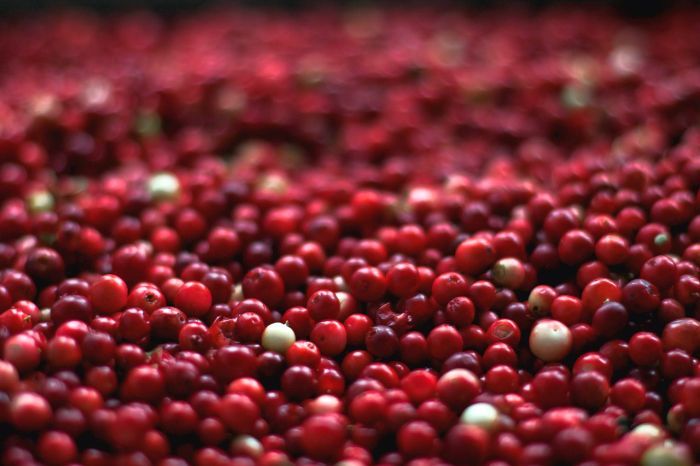Many people think of urinary tract infections (UTIs) as a human medical problem, but dogs can get them too. In fact, about 14% of dogs will suffer from one during their lifetime.
It is important to seek veterinary attention anytime your dog exhibits signs of a UTI, but many people are also interested in exploring home remedies. Cranberry juice and pills made from cranberry extracts have long been recommended for humans suffering from UTIs, so many owners consider giving similar pills to their dog.
But the question is: Are cranberry pills safe for dogs?
Generally speaking, yes – cranberry pills specifically made for dogs are usually safe.
But they do present a few minor risks, and they may not be terribly effective.
We’ll dig into the subject more below as we talk about cranberries, pills made from the glossy red berries, and the reasons they may help prevent dog UTIs.
Are Cranberries Safe for Dogs?
We’ll begin talking about cranberry pills by looking at the berries themselves. Are cranberries safe for dogs?
Yes – in moderation, cranberries are usually safe for dogs. They’re actually incorporated into a variety of high-end, healthy dog foods as they represent a great source of antioxidants and probably improve the food’s flavor too.

But, the berries are full of potentially problematic compounds called oxalates.
Oxalates are found in a variety of fruits and vegetables, including spinach, potatoes, and beets, among others. In small amounts, oxalates aren’t terribly troubling, but they can cause problems for dogs (or humans, for that matter) who consume too many.
Oxalates, it turns out, can increase your dog’s risk of forming kidney or bladder stones.
But aside from the oxalates they contain, cranberries don’t appear to represent many other major health risks to dogs.
What About Cranberry Pills? Are They Safe for Dogs?
Historically, humans interested in treating or preventing UTIs with cranberries would just drink cranberry juice, or they’d eat a ton of the fresh or frozen berries. But dogs are rarely willing to do the same.
Your dog probably won’t drink cranberry juice, and although some may munch on the odd cranberry as a treat, few will be interested in eating a fistful of berries.
Fortunately, there are alternatives. A number of manufacturers market supplemental pills or tablets made with cranberry extracts. Some are designed specifically for dogs, while others are formulated for human use.
Assuming they are made by a reputable, US-based manufacturer, cranberry pills designed for dogs are largely safe.
Some of these supplements also contain other (purportedly) active ingredients, such as apple cider vinegar. Like cranberries, these types of ingredients are generally considered safe for dogs in small doses.
Similarly, the inactive ingredients used to help bind the pills together and preserve them are safe for dogs.
One such product is To The Rescue Cranberry Chews. In addition to cranberry extract, these chews include licorice root and D Mannose, which the manufacturer claims will help protect the lining of your dog’s urinary tract.
Product
Details
- Keep your pet's urinary tract healthy with To The Rescue cranberry chews! Specially formulated to...
- Natural Urinary Tract Support Made from Natural Ingredients - Our Cranberry Chews reduce the need...
- Prevent UTI's and Bladder Infections - Our treats are made from the highest quality natural...
- These Cranberry Chews Help a Dog Find A Home - For every bottle of Cranberry chews sold, we donate a...
Can You Give Your Dog Cranberry Pills Made for Humans?
While cranberry pills made for dogs are generally safe, those made for humans can contain dangerous ingredients for your pet.
For example, many common cranberry pills are also fortified with Vitamin C.
In large amounts, Vitamin C can increase your dog’s risk of developing kidney stones. This is pretty concerning as the oxalates present in cranberry extracts already increase your dog’s risk for developing painful stones.
Additionally, some human-made cranberry pills may contain xylitol – an artificial sweetener that is extremely toxic to dogs. We don’t know of any specific human supplements that contain xylitol or other artificial sweeteners that may be harmful to dogs, but we haven’t reviewed the ingredients of all of the pills on the market, and xylitol is becoming increasingly common in many nutritional and health supplements.
So, while the actual cranberry extract used in the manufacture of human supplements isn’t dangerous for your dog, some of the other ingredients they contain may be hazardous.
Accordingly, it is best to stick to cranberry supplements specifically marketed for use by dogs.
For example, you might go with the cranberry chews below which are specifically designed for dog nutrition and to combat canine UTIs (although we’ll explain the debatable effectiveness below).
Details
- Dog Uti Treatment - Taste great, no mess, small and easy to chew bite-sized bacon and beef liver...
- Cranberry Pills for Dogs - No byproducts, no allergies, 100% safe, Made in America, veterinary...
- Bladder Control for Dogs - Help your dog feel great with the ultimate strength chewable cranberries...
- We Stand Behind It - Get your dog off drugs & medicines with this dog urinary supplement, relieve...
Note that other types of human medications used to treat UTIs, such as AZO, Uristat, and similar over-the-counter medications, are not safe for dogs. In fact, they’re pretty toxic to canines, so you should never give your dog these types of drugs.
Are Cranberries Actually Effective for Treating UTIs?
Now that we’ve established that cranberry pills made for dogs are more-or-less safe, it makes sense to consider their efficacy. After all, there’s no point in giving your dog cranberry pills if they aren’t going to help resolve or prevent UTIs.
Unfortunately, the answer isn’t entirely clear.
Let’s back up for a minute and discuss the reasons dogs get UTIs in the first place.
Why Do Dogs Get UTIs?
Contrary to popular perception, urine isn’t sterile.
Bacteria – including both harmless and pathogenic varieties — invade the urinary tract all the time. Most of these are flushed out when your dog pees so they don’t cause many problems.
However, some harmful bacteria are able to cling to the lining of the bladder and other components of the urinary tract, including the kidneys, ureters (the tubes that connect the kidneys to the bladder), and the urethra (the tube that serves as the exit point for urine from the bladder).
These bacteria then disrupt the proper function of the urinary tract and cause a variety of mild to moderate symptoms. Various E. coli strains cause most (approximately 45%) UTIs in dogs, but other species, including those belonging to the genera Staphylococcus, Proteus, and Klebsiella, can cause problems too.
And this brings us back to cranberries.
How Do Cranberries Play a Role in UTI Treatments?
Historically, cranberries and extracts made from them were thought to lower the pH of the urinary tract, causing it to become more acidic. This was thought to make it difficult for these bacteria to survive in the urinary tract, thereby helping to eliminate the problem.
But more recent research has demonstrated that cranberries don’t alter the pH of your dog’s urine very much – certainly not enough to be of any therapeutic value. There’s nothing about cranberries that appears to kill the bacteria that cause UTIs, nor do they appear to inhibit the growth of bacterial colonies.
However, cranberries (and a few other types of berries, including blueberries) do contain substances called proanthocyanidins. These compounds have been shown to prevent E. coli from adhering to the lining of the bladder. If the bacteria can’t stick to the lining of the bladder, they can’t cause problems.
So, while cranberry pills don’t appear to be terribly effective for treating UTIs, they may offer some preventative value.

Not So Fast: Problems with the Process
Despite the positive results provided by this research, it is important to note that most of it was conducted in laboratory settings.
This type of in vitro research, which takes place in a test tube, is different from in vivo research, which takes place in living dogs. Frequently, the results of the different types of research contradict each other. Some medications or supplements may work in a test tube but fail to prove effective in practice.
Most of the in vivo research on UTIs and cranberries has focused on human subjects, but at least one study sought to examine this mechanism in living dogs. The study’s results were positive and showed that cranberry extracts helped to prevent E. coli from adhering to the bladders of the dogs in the trial.
However, there were a number of problems with the study.
For one, the study only examined 12 dogs, which is far too small of a sample size to provide concrete conclusions.
Additionally, several of the experimental parameters were a bit odd, such as the omission of a control group and “blinding” practices (the participants shouldn’t know whether they are giving their dog cranberry extract or placebos).
On top of that, most of the research conducted on the relationship between cranberries and UTIs focused solely on E. coli strains – cranberry extracts may or may not prevent other types of bacteria from adhering to the bladder wall.
Bottom Line: Will Cranberry Supplements Prevent Dog UTIs?
Unfortunately, we don’t yet know whether cranberries or supplements made from them are helpful for preventing UTIs.
There are certainly plenty of anecdotal accounts that suggest that they are, but anecdotes and data are two separate things.
It seems likely that cranberry pills may help to prevent some UTIs, which may be very helpful for dogs who suffer from chronic infections. They may even help prevent UTIs from spreading or becoming worse. But they probably won’t help cure active UTIs.
To help your dog get over a UTI, you’ll almost always need veterinary assistance.
How Much Cranberry Supplement Can I Safely Give My Dog?
While most vets consider cranberry supplements safe for dogs, and some may even recommend their use, there is no widely accepted recommended dosage. However, one vet recommends administering 0.5 milliliters of cranberry juice per pound of body weight or 10 milligrams of extract per pound of body weight, each day.
Keep in mind that different cranberry pills contain different amounts of cranberry extract, so you’ll need to perform some careful arithmetic when figuring out how much to give your dog.
Nevertheless, you should probably consult your vet about an appropriate dosage before administering cranberry supplements to your pet. In fact, because all dogs are individuals who can react differently to different supplements, it is always a good idea to discuss the use of any supplement with your vet before beginning a treatment regimen.
Cranberry pills made for dogs probably won’t harm your pet, but they’re probably not terribly likely to help clear her UTI either. And because UTIs are painful and can lead to serious problems if neglected, you’ll want to take your pup into the vet anytime she exhibits signs of an infection.
Has your vet ever recommended giving your dog cranberry pills? Have you tried any of those marketed for dogs? Let us know about your experiences in the comments below.











5 Comments
February 25, 2023
We have a 13-year-old pug. A few years ago Bonnie started getting UTI’s, and they kept recurring. Eventually our vet prescribed cranberry pills. Bonnie gets one capsule per day, as she only weighs 20 pounds. So far, so good.
February 27, 2023
Glad they seem to be working for Bonnie. Thanks for sharing, Jerry!
October 21, 2019
My dog recently had a pretty stubborn UTI. He’s never had one before in the 3 years I’ve had him. He is 9. They sent off a culture & it did not come back eith anything conclusive as far as what bacteria but there were some crystals. He had 2 rounds of antibiotics and with the 2nd round they added veterinarian cranberry capsules. He had a 2nd urinalysis & it was cleared. They told me to continue with 2 cranberry capsules a day until gone to prevent the crystals. It could be weeks until they are complete. He is itching alot. I’ve added doggie Omegas back to his diet as a precaution.
December 5, 2021
My 5 year old Bouvier is just finishing her antibiotic for her first UTI. Currently I’m searching for some type of preventative measures. She’s a clean dog, not playing in any dirty areas and mostly in my house day and night. I read that cranberry can cause kidney stones. What can I use?
December 6, 2021
Hey, Jeannie.
Be sure to ask your vet for his or her recommendation, but you may not need any sort of preventative, unless she begins suffering from chronic UTIs. Just like people, dogs just occasionally get bladder infections.
Best of luck!